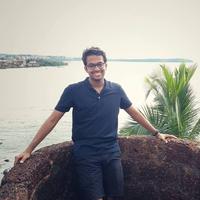My research interests include Analog/ Digital VLSI, Analog System Design and Communication Circuits.
Where did you get your internship and why did you apply there?
What interested you or attracted you to this particular internship and why?
I got my internship at Samsung Semiconductor India R&D Centre. I came here through Campus Interviews, where Samsung had come to NITK Campus to recruit third year students for their Summer Internship Program.
How did you get your internship?
Was it through the college or off-campus or through a senior/prof or through an internship website?
I had to undergo an on campus internship test. The test was followed by a group discussion round.
The test comprised of two sections, a general aptitude round (60 questions, 60 mins) and a technical round (25 questions, 45 min). The aptitude round consisted of 20 questions of verbal, logical and quantitative reasoning, each. The technical round consisted of various questions from digital design, analog electronics, assembly language programming and communication system basics.
I generally prepared using my second year class notes, and this was really useful. I also read up a bit more on analog electronics by following Prof. Razavi’s Basic Electronics video series.
However, the last I heard, Samsung had changed its pattern for the internship test. :p
As to what was asked in the group discussion, the HR had asked the shortlisted candidates to discuss about “The future of Smartphones”. The discussion was for 20 min and of the 15 shortlisted candidates, 7 were selected for the internship.
What was your internship about?
My internship was in the field of CMOS image sensor design, specifically in the analog design domain. CMOS design utilizes nanometer length transistors to design microscopic and compact circuits to make devices compact and more power efficient. My work mainly revolved around designing image filter models to remove temporal and spatial noise on images.
How was the work culture?
We had compulsory 9 hour per day work timings, but the entry timings were pretty flexible. Objective setting was done once every fortnight and weekly reviews were conducted by our managers and mentors. However, the unlimited supply of coffee, tea and soft drinks kept our juices running through the day.
What did you learn during the internship?
Was it challenging for you to do it? What new skills did you develop?
The work was definitely challenging since we had to model circuit behavior on software and for that, we had to read up extensively on how to mathematically model the circuit which we had designed. Testing our model with various test cases also proved to be time-consuming and any failure in the testing would set us back quite a lot.
Our team successfully managed to implement a de-noising filter for CMOS image sensors to effectively remove temporal noises from the images captured by the sensor matrix.
Tell us about the fun/ interesting incidents during the course of your internship.
At the end of the internship, our team manager and mentor treated us to a team outing and team lunch and we had a memorable farewell party that was conducted by the company on the last day of our internship.
What advice would you give to juniors regarding your internship?
Would you recommend a junior undergoing a similar internship at the same place you went?
Image sensor design is definitely an emerging field and with a constant demand for sleeker phones with higher performance, the design of compact image sensors is a challenge. I would definitely recommend those who are interested in analog system design or VLSI to pursue an internship in image sensor hardware.
